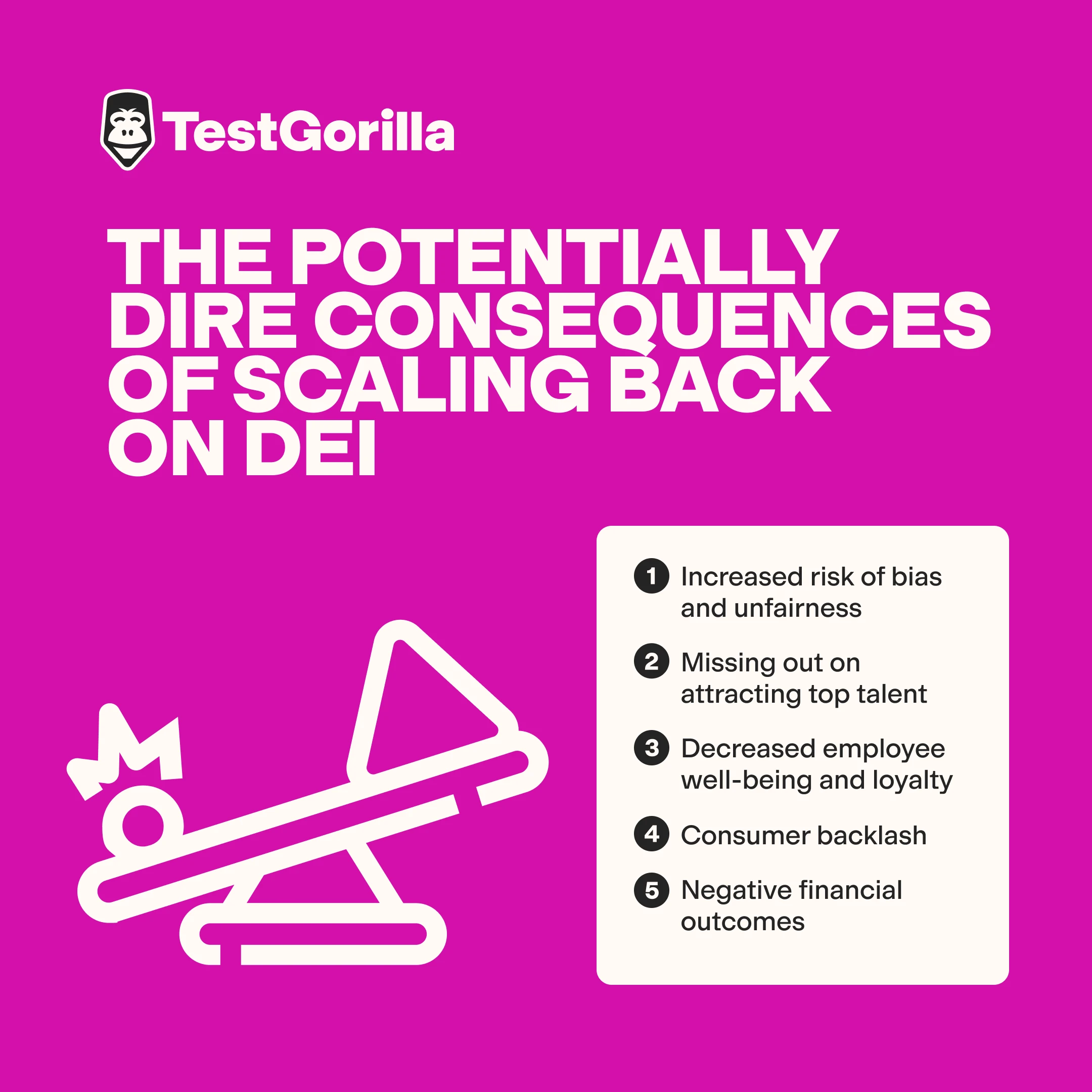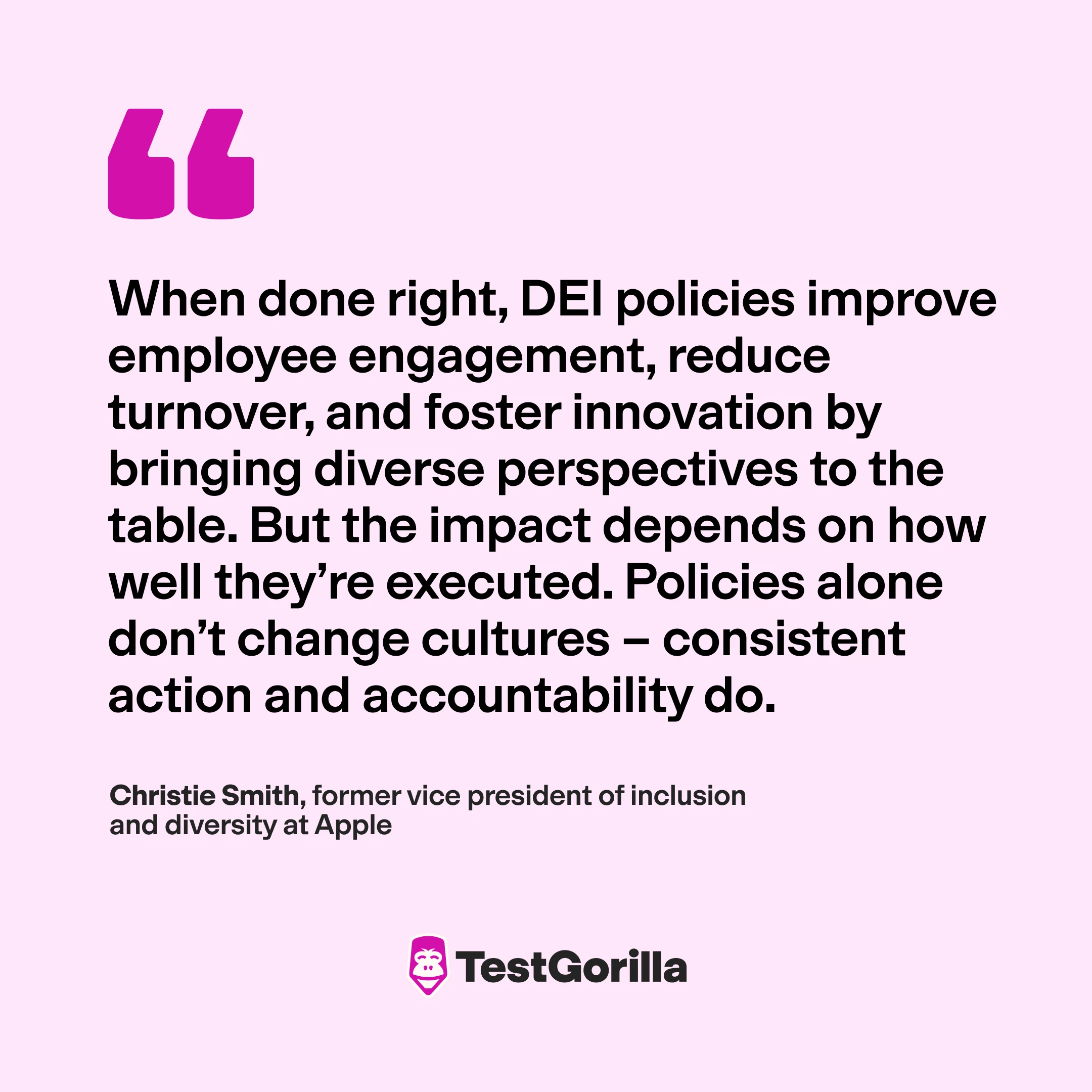“DEI would have ruined this country. And now it’s dead.”
With these words, newly elected President Trump declared an end to DEI (diversity, equity, and inclusion) programs in the federal government during a press conference on February 1st, 2025.
With a rising tide of political and cultural backlash against DEI, many employers are unsure where they stand.
My take? Companies must stand firm in their commitment to DEI policies and practices where they can.
In this article, I take a closer look at the shift away from DEI and explore why scaling back DEI could cost you more than you think.
What’s driving the DEI rollback?
After less than two months back in the White House, the new Trump administration has taken immediate action to end DEI programs in the public and private sectors.
One of President Trump’s first actions in the White House was to sign an executive order “ending radical and wasteful government DEI programs and preferencing” in federal agencies. The order also eliminated any DEI-related roles and described DEI programs as “illegal and immoral discrimination programs.” Additionally, it terminated diversity, equity, inclusion, and accessibility (DEIA) programs.
In line with this, federal agencies have banned employees from observing certain days, including Black History Month, Juneteenth, and LGBTQ Pride Month.
However, the White House’s determination to end DEI initiatives goes beyond the public sector.
According to a White House fact sheet on DEI in the private sector, “Billions of dollars are spent annually on DEI, but rather than reducing bias and promoting inclusion, DEI creates and then amplifies prejudicial hostility and exacerbates interpersonal conflict.”
Presumably acting on federal government direction, the Department of Justice (DOJ) and the Equal Employment Opportunity Commission (EEOC) have signaled a shift in how workplace discrimination will be investigated and prosecuted.
In February, the DOJ released a memo announcing a review of DEI and DEIA programs in the private sector, with the view to making proposals for criminal and civil compliance investigations. It signaled that the Department is also considering “other strategies to end illegal DEI and DEIA discrimination and preferences.”
Recent guidance on the EEOC’s website sets out several examples of potentially unlawful DEI-related discrimination, including using quotas and “taking an employment action motivated… by race, sex, or another protected characteristic.”
Even before the federal election, however, several US state governments took steps to restrict DEI initiatives. Most of this is related to the education sector following the Supreme Court decision in Students for Fair Admissions v. Harvard, which found affirmative action programs in universities to be unconstitutional.
These actions have contributed to the rising tide of anti-DEI sentiment. Sadly, this represents a significant shift away from years of government and private sector commitment to improving DEI in the workplace.
How has the private sector responded?
The private sector’s response to President Trump’s DEI pushback has been mixed.
Many large employers were quick to toe the line, apparently disregarding their previously firm DEI commitments.
For example:
Paramount removed hiring goals related to race, ethnicity, gender, and sex and plans to remove any links between its employee incentive program and DEI goals.
Citigroup is eliminating its “aspirational representation goals” and renaming its “Diversity, Equity and Inclusion and Talent Management” team to “Talent Management and Engagement.”
Google is reviewing its DEI policies and practices. It’s no longer setting aspirational hiring goals and has removed its written commitment to diversity, equity, and inclusion from its annual SEC filing.
Others have tried to hedge their bets, de-emphasizing diversity in their DEI commitments while reinforcing the steps they’re taking to build inclusive workplaces.
A final camp has courageously stood firm on its DEI priorities, for example:
Apple’s investors rejected a shareholder proposal to remove its DEI policies, procedures, and departments.
JPMorgan Chase’s CEO confirmed its commitment to DEI. The company has noted in documents that it expects criticism for its stance on “matters of public policy (such as diversity, equity, and inclusion initiatives).”
Delta Airlines Chief External Affairs Officer Peter Carter says the organization is “steadfast in our commitments [to DEI and environmental sustainability] because we think that they are actually critical to our business… really, DEI is about talent – and that’s been our focus.”
The best insights on HR and recruitment, delivered to your inbox.
Biweekly updates. No spam. Unsubscribe any time.
The potentially dire consequences of scaling back on DEI
Companies that choose to wind back their DEI initiatives risk missing out on the many benefits supporting diversity and inclusion in the workplace offers – and instead might face a slew of consequences.
1. Increased risk of bias and unfairness
The most obvious consequence of scaling back DEI efforts is that it allows unconscious bias to enter hiring and employment practices.
It’s all good to say employment decisions should be based purely on merit. But this assumes everyone is starting from an equal playing field, which simply isn’t the case.
Access to opportunities is often influenced by factors other than an individual’s merit – their socioeconomic background, where they went to school, where they live or grew up, and their personal networks.
DEI initiatives put checks and balances in place to ensure equal access and fair conditions for everyone. Without these measures, everyone is at risk of facing bias and unfairness in the workplace, especially minority groups who face systemic barriers to employment, structural racism, and historical discrimination.
2. Missing out on attracting top talent
DEI matters to candidates, and companies that fail to commit to it risk failing to attract top talent.
For its State of Workplace DEI survey, Benevity interviewed 1,000 US workers. Ninety-five percent of respondents say they consider a potential employer’s DEI efforts when deciding between job offers. Beyond this, 78% say they wouldn’t work for an employer who doesn’t dedicate significant resources to DEI programs.
This means employers must go beyond diversity washing to attract the best talent. Without taking clear, meaningful steps to support DEI – and communicating this with potential candidates – top applicants will look elsewhere for opportunities.
3. Decreased employee well-being and loyalty
There are proven links between inclusive workplaces and employee well-being.
Boston Consulting Group surveyed 16,000 participants across 16 countries. It found that 81% of employees who worked in inclusive environments were happy in their jobs – three times higher than those who felt their workplaces lacked inclusivity.
DEI also directly impacts employee loyalty. According to Great Place to Work, employees who know they’ll be treated fairly regardless of their personal characteristics are 5.4 times more likely to remain with their employer long-term.
It stands to reason that the opposite can happen when employers step back from their DEI commitments. Employees are less likely to feel psychologically safe at work, affecting their morale and loyalty. This could have disastrous effects on productivity and, ultimately, employers’ bottom lines.
4. Consumer backlash
DEI matters to consumers. Dial back your commitments, and you risk losing customers and undermining brand loyalty.
A survey by Amazon Ads for its 2022 Higher Impact report spoke to 7,213 consumers in seven countries. Seventy-three percent of respondents said it’s important that the brands they buy from take steps to promote DEI.
This is especially true for key minority consumer groups with increasing buying power.
A February 2025 survey by Collage, a cultural intelligence firm, asked over 1,000 consumers about their purchasing habits in light of companies scaling back their DEI commitments. A third of respondents who were aware of DEI rollbacks have stopped or reduced buying from brands that do so.
These sentiments were particularly strong for Black (45%), Hispanic (45%), and LGBTQ+ (58%) consumers who say they’ve reduced their spending or intend to do so in the next three months with companies that have stepped back from their DEI commitments.
The impact on companies’ brands – and bottom lines – is clear. According to Collage’s data, brands risk losing access to more than $1 trillion in purchasing power from these key growth segments in the coming years.
We’re already seeing examples of consumer backlash. For example, following Target’s announcement that it was ending hiring goals for minority employees and scaling back diversity initiatives, the company has faced much public criticism, protests at its headquarters, social media blowback, and calls for a boycott.
5. Negative financial outcomes
When we think about these potential consequences, it’s clear that a lack of DEI naturally impacts a company’s bottom line. Recruitment challenges, lower employee morale, and unhappy consumers mean decreased profits.
For its Diversity Matters Even More report, McKinsey reviewed data from 1,265 companies across 23 countries. The conclusion? Ethnically and gender-diverse companies are 39% more likely to outperform competitors financially.
A good way to consider DEI is as a “strategic intangible asset." Researchers at the London School of Economics describe its potential in this way. Their 2024 research found a positive link between DEI, long-term market valuation, and higher levels of innovation.
Why companies should continue to prioritize DEI
My main issue with the current take on DEI is that it fundamentally misunderstands how the concept works.
Anti-DEI supporters argue that it gives preference to certain minorities, discriminating against others. This simply isn’t true.
DEI isn’t about preferencing some candidates or employees over others, giving them an unfair advantage based on their gender, race, or religion. It’s about acknowledging the obvious reality that historic inequities and unconscious biases exist in the workplace and affect access to opportunity. DEI lifts everyone to ensure an equal starting point for all.
What this means is that DEI benefits everyone, not just a select few.
The research backs this up. In the Benevity survey I mentioned earlier, 90% of employees say they’ve personally benefited from workplace DEI initiatives. (For what it’s worth, 60% and 54% of the respondents in this survey were white and male, respectively.)
Let’s use the analogy of a running race. In this race, one person starts at the front. The second runner starts 100 meters behind them, and the third runner is 100 meters behind the second runner. From the very beginning, two racers are at a disadvantage. They must work twice or three times as hard as the first runner to catch up.
Sounds unfair, right? Because it is.
DEI ensures everyone's starting line is in the same place
You’re not discriminating against the first racer by putting everyone in the same starting position. You’re leveling the playing field so that all runners have an equal shot at winning.
For example, hiring managers might do this by assessing all their applicants’ skills before reviewing their resumes (as resume screening first could lead them to prioritize applicants with fancy degrees or experience – something that not all applicants will have had access to).
Anti-DEI supporters say the focus should be on merit rather than personal characteristics. But as the above example shows, DEI is about merit: It’s about putting everyone on the same footing to assess their merit.
Employers worldwide should commit to DEI to the fullest extent possible. This means going beyond mere lip service. Employers must, where they can, take actionable steps to show they’re serious about DEI. Especially outside of the US, in places where DEI isn’t being persecuted. The rest of the world needs to double down.
Speaking to ABC News, Christie Smith, former vice president of inclusion and diversity at Apple, says,
When done right, DEI policies improve employee engagement, reduce turnover, and foster innovation by bringing diverse perspectives to the table. But the impact depends on how well they’re executed. Policies alone don’t change cultures – consistent action and accountability do.
In saying this, I recognize that DEI is a complex issue for US employers to navigate right now. These employers must ensure that their policies and practices comply with the law, which is currently opaque and ever-changing.
US employers must monitor the situation and seek legal advice about how best to comply with evolving laws.
At the same time, thought crimes haven’t been outlawed (yet). Regardless of what the government says or does, business leaders can still believe strongly in DEI and champion it to the extent possible within the law.
And in my opinion, every business should do this – it’s a matter of social justice, and it’s what’s right.
Scaling back DEI could cost you more than you think
There’s a noticeable political and cultural shift away from DEI, so it’s easy to understand why some employers are getting cold feet and winding back their commitments. But at what cost?
With the potential for more unfairness and inequity, lower employee morale, consumer backlash, and poorer financial outcomes, businesses should think carefully before axing their DEI practices. When hiring, employers should stay the course and ensure fairness by taking a skills-based approach, using inclusive language in job descriptions, and standardizing interviews.
Scaling back DEI practices may seem like the easy option now, when the long-term consequences for candidates, employees, and businesses are unseen. But they will soon be hard to ignore.
Disclaimer
The information in this article is a general summary for informational purposes and is not intended to be legal advice. DEI laws in the US are currently subject to constant change, and their application varies based on your individual circumstances. You should always seek legal advice from a qualified attorney about your legal obligations as an employer, especially in the current climate. While this summary is intended to be informative, we cannot guarantee its accuracy or applicability to your situation and cannot be held liable for any decisions made due to it.
You've scrolled this far
Why not try TestGorilla for free, and see what happens when you put skills first.
















